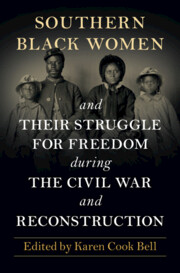Book contents
- Southern Black Women and Their Struggle for Freedom during the Civil War and Reconstruction
- Southern Black Women and Their Struggle for Freedom during the Civil War and Reconstruction
- Copyright page
- Dedication
- Contents
- Figures
- Tables
- Contributors
- Acknowledgments
- Introduction
- Part I Emancipation and Black Women’s Labor
- Part II War, Gender Violence, and the Courts
- 4 Black Women, War, and Freedom in Southern Louisiana and Low Country Georgia
- 5 Rape and Mutiny at Fort Jackson
- 6 “I Told Him to Let Me Alone, That He Hurt Me”
- Part III Emancipation, the Black Family, and Education
- Notes
- Index
6 - “I Told Him to Let Me Alone, That He Hurt Me”
Black Women and Girls and the Battle over Labor and Sexual Consent in Union-Occupied Territory
from Part II - War, Gender Violence, and the Courts
Published online by Cambridge University Press: 14 December 2023
- Southern Black Women and Their Struggle for Freedom during the Civil War and Reconstruction
- Southern Black Women and Their Struggle for Freedom during the Civil War and Reconstruction
- Copyright page
- Dedication
- Contents
- Figures
- Tables
- Contributors
- Acknowledgments
- Introduction
- Part I Emancipation and Black Women’s Labor
- Part II War, Gender Violence, and the Courts
- 4 Black Women, War, and Freedom in Southern Louisiana and Low Country Georgia
- 5 Rape and Mutiny at Fort Jackson
- 6 “I Told Him to Let Me Alone, That He Hurt Me”
- Part III Emancipation, the Black Family, and Education
- Notes
- Index
Summary
Kaisha Esty demonstrates that during the American Civil War, laboring African American women and girls in Union-occupied territory embarked on their own war over the use of their bodies. As fugitives, “contraband,” and refugees, displaced Black women and girls of liminal status confronted gender violence in conditions that often resembled the systemic sexual violence of slavery. As this chapter argues, central to this gender violence was the assumption that Black women were always willing to negotiate sex as part of their (nonsexual) labor. The introduction of wartime legislation protecting women from sexual assault was pivotal. In race-neutral terms, such legislation created a powerful avenue for refugee Black women and girls not only to seek sexual justice but also to challenge and redefine existing cultural and legal understandings of sexual consent. Analysis of testimonies to wartime sexual violence in Tennessee and South Carolina uncovers how formerly enslaved African American women and girls located their violation in relation to their sense of virtue, respectability, and sexual sovereignty.
- Type
- Chapter
- Information
- Southern Black Women and Their Struggle for Freedom during the Civil War and Reconstruction , pp. 99 - 116Publisher: Cambridge University PressPrint publication year: 2023

